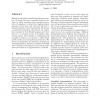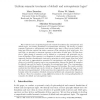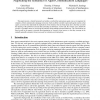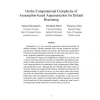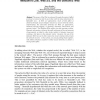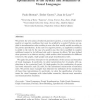116
Voted
ENTCS
2000
15 years 2 months ago
2000
Haskell currently lacks a standard operational semantics. We argue that such a semantics should be provided to enable reasoning about operational properties of programs, to ensure...
118
click to vote
CORR
2000
Springer
15 years 2 months ago
2000
Springer
We revisit the issue of epistemological and semantic foundations for autoepistemic and default logics, two leading formalisms in nonmonotonic reasoning. We develop a general seman...
120
Voted
CI
2002
15 years 2 months ago
2002
This paper presents a formal framework and outlines a method that autonomous agents can use to negotiate the semantics of their communication language at run-time. Such an ability...
135
click to vote
AAMAS
2000
Springer
15 years 2 months ago
2000
Springer
This article examines the issue of developing semantics for agent communication languages. In particular, it considers the problem of giving a
104
Voted
APAL
2002
15 years 2 months ago
2002
The paper introduces a semantics for the language of classical first order logic supplemented with the additional operators and . This semantics understands formulas as tasks. An ...
103
Voted
APAL
2004
15 years 2 months ago
2004
First-order modal logic is very much under current development, with many different semantics proposed. The use of rigid objects goes back to Saul Kripke. More recently several se...
115
Voted
AI
2002
Springer
15 years 2 months ago
2002
Springer
ko et al. have recently proposed an abstract framework for default reasoning. Besides capturing most existing formalisms and proving that their standard semantics all coincide, th...
130
Voted
WS
2008
ACM
15 years 2 months ago
2008
ACM
: The power of the Web is enhanced through the network effect produced as resources link to each other with the value determined by Metcalfe's law. In Web 2.0 applications, mu...
121
Voted
VLC
2008
15 years 2 months ago
2008
We present the new notion of enforced generative pattern, a structure that declares positive or negative conditions that must be satisfied by a model. Patterns are applied to tran...
100
Voted
JUCS
2007
15 years 2 months ago
2007
Abstract: Object-Oriented Action Semantics is a semantic framework for the definition of programming languages. The framework incorporates some object-oriented concepts to the Act...
